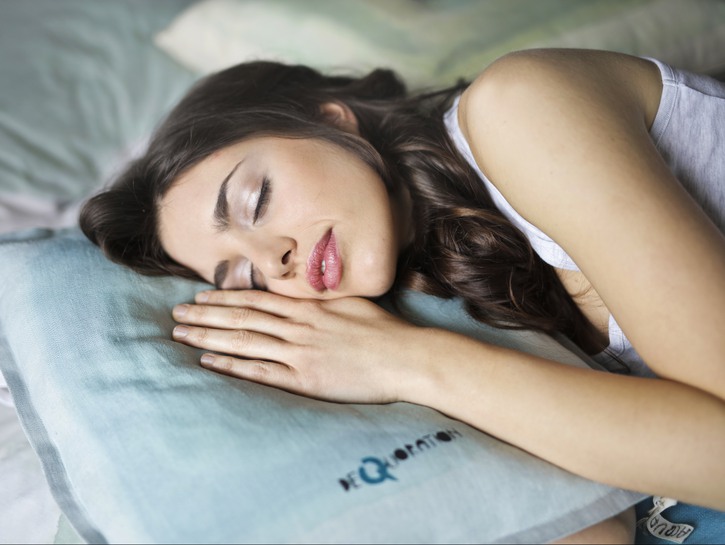Are you struggling to fall asleep? Do you crave that deep sleep that leaves you refreshed when you wake up? Fortunately, there are plenty of natural sleep aids and easy steps to take in order to get better sleep. We collected 11 tips and tricks to create the nighttime routine of your dreams.
Reduce Blue Light Exposure
Blue light refers to the short wavelengths of light often emitted from digital screens. According to the National Sleep Foundation, “the blue light that’s emitted from these screens can delay the release of sleep-inducing melatonin, increase alertness, and reset the body’s internal clock.” Consider setting a digital curfew for yourself and turn off the phone before bed. You can also dim the brightness on your screen. There are many apps that warm the colors on the screen for your electronics, so you’re getting less problematic light.

Reduce Caffeine Consumption
Psychology Today cited a recent study, noting how, “caffeine consumed 0, 3, and 6 hours before bedtime significantly reduced total sleep time. Even caffeine consumed 6 hours before bed reduced total nightly sleep amounts by more than 1 hour.” Set a caffeine cut-off time for yourself so it won’t affect your sleep. Drinking your most caffeinated drinks in the morning and slowly tapering off to caffeine-free drinks by the later afternoon will significantly lower the risk of caffeine keeping you up.
Reduce Long Daytime Naps
Spending too much time napping during the day can seriously impact your quality of nighttime sleep. According to the aptly named Sleep.org, “20- to 30-minute naps are often best…try to make sure that you wake up no less than three hours before your bedtime.” If you are craving a nap, a shorter one well before bedtime is your best option.
Keep A Consistent Sleeping Schedule
Consistency is one of the best ways to help you sleep. Som Sleep says, “if you constantly change the time you fall asleep and wake up, your body won’t be able to adjust to a set schedule…an irregular sleep schedule can cause irritability, drowsiness, mood swings, concentration and memory problems.” It will take several days to develop a new routine, but it’s more than worthwhile when you wake up fully refreshed.

Take A Relaxing Shower Or Bath
One way to unwind after a long day includes a brief shower or bath before bed. According to Medical News Today, “the best time for taking a shower or a bath is 1–2 hours before going to bed. The duration of the shower or bath does not need to be longer than 10 minutes for a person to reap the benefits…our body temperature tends to drop after a warm bath, which can induce better sleep.”
Consider Taking Supplements, Like Melatonin
Melatonin is a naturally produced hormone that lets your body know when it’s sleepy time. However, if your natural supply isn’t enough, you may consider melatonin supplements. These are pills containing high doses of melatonin. Tuck.com says, “melatonin should be taken shortly before the person wants to go to sleep. You will not not feel an onslaught of sleepiness; the supplement has a subtle effect.” It won’t be instantaneous, but over time it could make a huge difference.

Avoid Alcohol Before Bed
The National Sleep Foundation says, “after drinking, production of adenosine (a sleep-inducing chemical in the brain) is increased, allowing for a fast onset of sleep. But it subsides as quickly as it came, making you more likely to wake up before you’re truly rested.” This interference also greatly impacts the body’s natural circadian rhythms and makes for more bathroom trips.
Invest In A Comfortable Mattress, Comforter, and Pillows
One major factor contributing to your restlessness? The supplies you’re using. The right combination of mattress, comforter, and pillows can go a long way in supporting your body and preventing stiff muscles. It is so worth it to do your research and find the best options for your body.
Exercise Regularly
Even a brief round of exercise can go a long way in wearing you out and getting more rest. Sleep.org says, “Physical activity improves sleep quality and increases sleep duration. Exercise may also bolster sleep in other ways, because it reduces stress and tires you out.”

Meditate
A brief meditation session before bed can calm your mind after a hectic day. According to the National Sleep Foundation, “The deep relaxation technique has been shown to increase sleep time, improve sleep quality, and make it easier to fall (and stay) asleep.” There are many apps and online videos to help you clear your head after a busy day.
